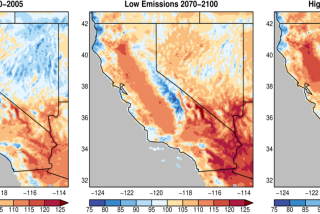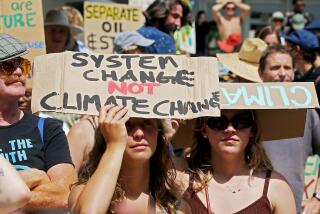Pesticide cases could be upended
- Share via
The unraveling of multimillion-dollar Los Angeles cases alleging that Nicaraguan men had been sterilized by pesticide exposure is now threatening to upend hundreds of other claims in U.S. courts, as judges examine charges that plaintiffs’ lawyers orchestrated an extraordinary international fraud.
At the center of the claims is the pesticide DBCP and allegations that workers in banana plantations in Central America and Africa were harmed by exposure to the chemical.
In November 2007, a Los Angeles jury awarded $5.7 million to six Nicaraguan men who sued Dole Food Co. and chemical companies, alleging they had been made sterile by DBCP on Dole’s plantations. The amount was later reduced by a judge and is now on appeal. The case will probably be thrown out entirely in the wake of a judge’s findings of fraud in two related cases.
Those cases against Dole, Dow Chemical Co. and AMVAC Chemical Corp. were set to go to trial this year. Then, in April, Superior Court Judge Victoria Chaney dismissed the claims, ruling that U.S. lawyers and their Nicaraguan partners had concocted the cases through an audacious fraud, recruiting plaintiffs who had never worked on banana plantations, training them to lie on the witness stand and then waging a campaign of intimidation to prevent the scheme from being uncovered.
Chaney’s ruling could now affect hundreds of similar claims by plaintiffs from Nicaragua, Panama, Guatemala, Honduras, Costa Rica and Ivory Coast that are pending in U.S. courts, legal experts said.
The judge’s ruling has already become a focal point in a federal court in Florida, where a judge is considering whether Dole and four other multinational fruit and chemical firms should pay $97 million awarded to 151 plaintiffs by a court in Nicaragua in 2005. Those cases have been on hold since early this year, when the Florida judge decided to await the outcome here before taking further action.
Nicaraguan courts have awarded more than $2 billion to thousands of peasants with DBCP claims since 2001 -- but with no means to help them collect. The plaintiffs turned to the federal court in Florida to try to enforce the Nicaraguan judgment. If they prevail, it is likely that other winners in the Nicaraguan system will attempt to collect judgments in U.S. courts.
In addition to its effect on those cases, the Los Angeles ruling will probably dissuade other plaintiffs’ attorneys and make other U.S. judges more skeptical about DBCP claims brought before their courts, experts said.
“Once you see fire, you look closer to see if there’s smoke in other cases like this one,” said Stephen Yeazell, a UCLA law professor who specializes in international civil litigation.
DBCP, or dibromochloropropane, was used on banana farms in the developing world until at least 1979, two years after it was linked to sperm damage in factory workers who produced the chemical.
Litigation over DBCP has become something of an international industry in recent years, with U.S. lawyers competing for clients abroad with the goal of getting U.S. courts to try their cases or enforce foreign judgments.
The claims of the farmworkers had been portrayed sympathetically in the media, including in a documentary film -- premiered at the Los Angeles Film Festival last month -- that told the story from the point of view of plaintiffs in Nicaragua. Last week, attorneys for Dole sued the Swedish filmmaker behind the documentary for slander and libel, arguing that Chaney’s ruling proved it was inaccurate and defamatory.
Chaney’s ruling could lead to the end of the workers’ litigation against Dole entirely or, at minimum, severely cloud plaintiffs’ cases. The cases in Los Angeles Superior Court, spearheaded by Juan Dominguez, a personal-injury lawyer best known for his ads on Los Angeles buses, consumed months of court time and millions of dollars. Dominguez is now being investigated by the California state bar, under an order from Chaney.
The scam, Chaney wrote, was part of a much wider fraud in Nicaragua -- a thriving industry of manufacturing plaintiffs to capitalize on a justice system rigged against multinational corporations.
At the center of that system, she wrote, is a law passed by the Nicaraguan government in 2001 that ordered the courts to fast-track DBCP claims.
Anybody claiming to have been exposed to the chemical on a banana farm who can produce a lab report showing he is sterile is entitled to damages. Evidence presentation is limited to eight days, after which the court has three days to decide the case. Defendants, such as Dole, must deposit millions of dollars in a trust for the right to defend themselves. They generally don’t bother because it is almost impossible for them to win.
As the Florida case is set to restart, attorneys for Dole have already submitted Chaney’s ruling to bolster their argument that the $97-million judgment in Nicaragua was a sham.
The plaintiffs’ attorneys countered that Chaney’s ruling is full of inaccuracies and overly broad.
“It’s amazing to me that a judge can criticize in a sweeping way an entire country’s integrity and make a ruling on every individual’s honesty and integrity, even those who aren’t before her,” said plaintiffs’ attorney Steven Marks of the Miami-based firm Podhurst Orseck.
Chaney’s ruling implicates Provost and Umphrey, a Texas law firm representing plaintiffs in the Florida case along with Podhurst Orseck, in the alleged fraud in Nicaragua. Chaney wrote that one of its attorneys, Mark Sparks, was present in a 2003 meeting in Nicaragua at which lawyers, medical laboratory officials and a judge set out a plan to manufacture evidence and bolster cases in the Nicaraguan courts.
In court filings, Sparks and his firm denied he ever attended such a meeting, and argued that Chaney’s ruling was fundamentally unfair because it did not offer them the right to defend themselves.
The ruling was based primarily on information from witnesses whose names and unredacted testimony to Dole lawyers remain sealed under an order by Chaney, who became convinced that their lives would be in danger if their identities were made public.
In any case, the plaintiffs’ lawyers in the Florida case said they had no involvement in the California cases.
Sparks and his firm released a statement saying they “are confident that our investigation, testing and diagnosis protocols were superior to other firms in this litigation.”
The battle over DBCP is part of a murky debate in international law about how justice should be administered when a company is accused of wrongdoing on foreign soil.
International law prefers that cases be tried where they happen. But many courts in the Third World are ill-equipped to handle complex cases, have little authority to enforce judgments and often do not afford attorneys the powers they would have in U.S. courts to gather evidence.
“There are alleged international, global wrongful acts, but we don’t have a proper forum, and it’s ping-pong between countries, between the courts of developing and developed countries,” said Alejandro Garro, a Columbia University law professor who has testified on behalf of banana workers.
Before the Nicaraguan fast-track law went into effect, multinational defendants were generally able to keep their cases out of U.S. courts and stalled in the Nicaraguan system.
However, the fast-track law made the prospect of a Nicaraguan trial so unappealing to multinational corporations that they began agreeing to have such cases heard in U.S. courts.
That, of course, is no guarantee of success.
In addition to the cases from Nicaragua, a DBCP lawsuit brought before Chaney by nearly 700 men from Ivory Coast is also unraveling.
In April, a man claiming to represent workers there contacted Dole, offering information about the plaintiffs’ lawyer in that case, Raphael Metzger.
“We are ready to collaborate with any initiative to expose and prosecute corrupt lawyers,” Jean Pierre Nassoue wrote in an e-mail to a Dole executive.
Attorneys for Dole asked Chaney for permission to look into Nassoue’s claims and bring him to the U.S. to testify. Metzger objected, saying Nassoue was a dangerous, disgruntled former legal assistant who was trying to blackmail him for more money.
In June, Metzger indicated that he would like to withdraw as the plaintiffs’ counsel on the case, telling the court that the allegations by Nassoue makes it impossible for his firm to effectively represent them.
--
alan.zarembo@latimes.com
More to Read
Sign up for Essential California
The most important California stories and recommendations in your inbox every morning.
You may occasionally receive promotional content from the Los Angeles Times.












